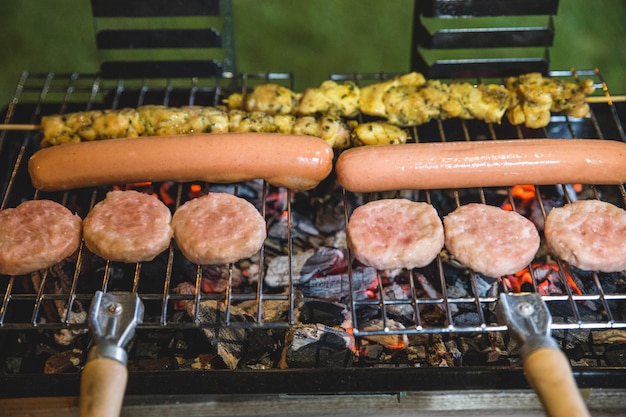Are BBQ Sausages Gluten-Free?
When it comes to barbecues, one of the most popular food choices is sausages. However, for individuals with gluten intolerance or celiac disease, consuming gluten-containing foods can lead to various health issues. Therefore, it is crucial to determine whether BBQ sausages are gluten-free or not. In general, traditional sausages may contain gluten as they often include fillers and binders that contain wheat-based ingredients. However, there are alternatives available in the market that cater to those who follow a gluten-free diet.
The Issue with Traditional BBQ Sausages
Traditional sausages typically contain gluten due to the addition of various fillers, breadcrumbs, or other wheat-based ingredients. Gluten acts as a binder, helping to keep the sausages together and maintain their shape. This becomes problematic for individuals on a gluten-free diet as even small amounts of gluten can trigger adverse reactions in those with gluten intolerance or celiac disease.
It is essential to carefully examine the ingredient list when purchasing sausages to determine if they contain any gluten-based additives. Common ingredients to look out for include wheat flour, breadcrumbs, maltodextrin (often derived from wheat), and other wheat-based fillers. Additionally, cross-contamination can occur during the manufacturing process, making it necessary to select sausages that are specifically labeled as gluten-free.
Gluten-Free Alternatives
Fortunately, with the increasing awareness and demand for gluten-free options, many manufacturers now offer sausages specifically formulated to be gluten-free. These sausages are made using alternative ingredients and binders that do not contain gluten. Instead of wheat-based fillers, they may use rice flour, cornstarch, or other gluten-free alternatives. It is important to note that while these sausages are gluten-free, it is still advisable to check for other allergens that might be present.
When shopping for gluten-free BBQ sausages, look for products that are clearly labeled as such. This ensures that they have been produced in a separate facility or under strict conditions to prevent cross-contamination with gluten-containing ingredients. Many supermarkets and specialty food stores now stock a range of gluten-free sausages, making it easier for individuals with dietary restrictions to enjoy a tasty barbecue feast.
The Importance of Labeling and Certification
“Clear labeling and certification play a vital role in guiding individuals with gluten intolerance or celiac disease towards safe food choices.”
Clear labeling is crucial in distinguishing whether a product is gluten-free or not. When purchasing sausages, it is essential to read the labels carefully to ensure they meet your dietary requirements. Look for certifications such as the Coeliac UK Crossed Grain symbol, which indicate that the product has been tested to meet gluten-free standards. This symbol provides reassurance and peace of mind for individuals with gluten sensitivities.
An increasing number of manufacturers now voluntarily submit their products for gluten testing to obtain gluten-free certification. This certification demonstrates a commitment to meeting stringent gluten-free standards, ensuring that the product is safer for consumption by those with gluten intolerance or celiac disease.
DIY Gluten-Free BBQ Sausages
If you enjoy cooking and want to have full control over the ingredients that go into your BBQ sausages, making them at home is an excellent option. By using gluten-free ingredients and fillers, you can create delicious sausages tailored to your dietary needs.
Here is a simple gluten-free BBQ sausage recipe to inspire you:
- Ingredients:
- 500g minced meat (e.g., pork, turkey, chicken)
- 1 teaspoon salt
- 1 teaspoon pepper
- 1 teaspoon paprika
- 1 teaspoon dried herbs (e.g., thyme, oregano, rosemary)
- 1 tablespoon olive oil
- Optional: diced vegetables or cheese for extra flavor
- Instructions:
- In a large bowl, mix together the minced meat, salt, pepper, paprika, dried herbs, and any optional ingredients.
- Cover the bowl and refrigerate for at least 30 minutes to allow the flavors to meld.
- Shape the mixture into sausages of your desired size and thickness.
- Preheat the grill or barbecue to medium-high heat.
- Brush the sausages with olive oil and place them on the grill.
- Cook for approximately 12-15 minutes, turning occasionally, until the sausages are cooked through.
- Remove from the grill and let them rest for a few minutes before serving.
This recipe serves as a basic guideline, but feel free to experiment with different herbs, spices, and seasonings according to your taste preferences.
In Conclusion
While traditional BBQ sausages often contain gluten, there are now plenty of gluten-free alternatives available. It is important to carefully read labels, look for gluten-free certifications, and select sausages that are specifically labeled as gluten-free to ensure they meet your dietary requirements. Additionally, making your own gluten-free sausages at home allows you to have greater control over the ingredients and customize them according to your preferences. With the right knowledge and choices, individuals with gluten intolerance or celiac disease can still enjoy delicious BBQ sausages without compromising their health.



